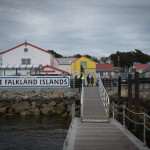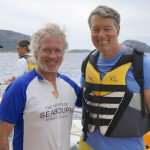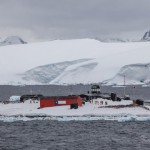
I was in the shower when the announcement came over Seabourn Quest’s public address system on Monday afternoon. It was the captain’s voice, so I knew I had better listen. I shut off the water and poked my head out the shower: There had been a brief power outage to the bridge’s navigation system, and in the interest of safety, we could not continue our voyage as planned.
Captain Bjarne Larsen, consulting with Seabourn’s offices back in Seattle, had determined that the best course of action was to deviate to Puerto Madryn, Argentina, where we’d pick up a technician and a spare part — two days from the moment the initial announcement was made. At stake: Port Stanley in the Falkland Islands, which was to have been our next port of call, and possibly, Antarctica itself.
An Officer And A Gentleman
That evening, at the Captain’s Welcome Aboard Reception, the Danish officer addressed the audience with heartfelt frankness. “I’m disappointed that I am disappointing you,” he told the more than 400 guests on board.
He held up his hands to make a circle with his forefinger and thumb, illustrating the size of the part that had caused the problem. The captain made no assurances, other than to convey what he knew for certain. At approximately 2 p.m. the next day, we would come alongside in Puerto Madryn, he said, overnight there to wait for the arrival of the needed part the next day, install and test the part, then set sail for Antarctica, most likely, at around 6 p.m. on Wednesday — if all went as planned.
“Going out on stage and knowing that you have to disappoint the guests, that’s a tough call,” the captain told me when I interviewed him later on the bridge. “And at that time, I couldn’t promise anything, because I didn’t know how long it would take for us to resolve the issue in Puerto Madryn, and I didn’t know if I could make it to the Falklands. I didn’t want to give the guests any false expectations. I had already disappointed them one time. I didn’t want to do it twice.”
Following the Welcome Aboard Reception and his speech, Captain Larsen told the audience that he and the chief engineer would be available at Seabourn Square (the social hub of the ship) immediately afterward for anyone who had concerns and/or questions. “When things like this happen, you will always have guests who have more questions, and it’s good to give them the opportunity to talk to you, and also to let them vent their frustrations,” the captain told me. “They might be upset, they might be disappointed. I’m there to take the bullets, so to speak, and hopefully, I can explain to them what’s going on and make them feel better about it.”
Listening To Guests
Of those who visited the captain at Seabourn Square that night, about “half were coming up to thank me for my speech; they said they understood and that they were thankful to me for considering their safety.”
Earlier in the day, following his initial announcement, the captain had also gone out into the public areas and spoke with guests. What he heard repeatedly was that while guests were grateful that the captain was considering their safety, many were disappointed that they would be missing the Falkland Islands. Later that night, the captain expressed to the head office the desires of the guests: to prioritize the Falkland Islands and Antarctica.

The decision to deviate to Puerto Madryn was not an easy one, but Seabourn Quest was headed into remote territory, the Antarctic Peninsula, and redundancy of parts was important for safety. “In Antarctica, we can’t easily get help, we cannot dial 911,” the captain told me as we looked over charts in the ship’s bridge. “There’s no helicopter nearby, no airport. There aren’t any stores with spare parts, so we have to be prepared.”
Waiting It Out In Puerto Madryn
Puerto Madryn was sunny and warm on the afternoon that Seabourn Quest docked alongside a long pier that led into the city center. The ship’s Destination Services department had organized tours, including a whale-watching excursion that guests later raved about. Explained one couple: A baby whale had come close enough to the tour boat for guests to touch the beautiful creature.

While guests were out touring or strolling the beaches and city streets, the captain and his officers were communicating with the head offices in Seattle. The “mothership” was keeping track of the technician, who was flying from Italy. So far, so good. All was going as planned, and it appeared the technician would arrive ahead of schedule.
At around 9 a.m. on Wednesday morning, Cruise Director “David E.” (Greene) sounded as if he had something exciting to say when he came over the public address system — an indeed he did. “The captain has asked that all guests be back on board Seabourn Quest at 2:30 p.m.” That was three hours ahead of schedule. Something was up.
At 3 p.m., Seabourn Quest was getting ready to sail. Testing on the spare part had been completed, the captain announced, and much to our surprise, he added, Seabourn Quest would be charting a course for the Falkland Islands — with no interruption of our time in Antarctica.
“I heard some feedback from my officers who were out on deck that there were cheers around the ship,” the captain said to me when I asked about the reaction of his announcement.
Port Stanley, Put The Pedal To The Metal
Deviating to the Falkland Islands when Antarctica was a straight shot south came at great expense for the company, namely in the cost of fuel to put the pedal to the metal and make a run for the islands. Regulations require ships to use marine gas oil, which is less polluting but considerably more expensive than so-called heavy fuel.
The distance from Puerto Madryn to Port Stanley was more than 600 nautical miles. Seabourn Quest would need an average speed of 17 knots to make it by Friday morning. Then, after spending most of the day in the Falklands, we’d speed toward Antarctica, keeping only hours ahead of a low-pressure system that was moving into the Drake Passage and threatening rough seas.
We are scheduled to be across the Drake and in the Antarctic Peninsula on Sunday, December 7. We’ll spend five or six days in Antarctica, depending on the weather, and arrive a day after scheduled in Ushuaia, on December 14. Seabourn Quest concludes the cruise in Valparaiso on December 20.
A Job Well Done
Companies are often defined by the ways they respond to adversity. Captain Larsen, his crew and those back in the home office in Seattle did everything right.
First, the captain prioritized safety for guests and crew. Next, he informed guests what had happened and kept them informed with each new development. The captain made himself available for guests to ask questions and to express their concerns.
On extremely short notice (around midnight Seattle time), the company arranged for a technician and spare part to travel halfway around the world as quickly as possible — and then to make it down to Puerto Madryn.
Then, the remarkable conclusion. Despite the odds, the captain had been able to maintain the original itinerary, with only slight modifications to the timing. Plus, guests got an extra port of call, Puerto Madryn.
If there is a lesson in our episode at sea, it is that during such situations it is important to communicate frequently and thoroughly, leaving no one in the dark about what is going on. “Communication is one of the keys to success when you have things like this going on,” Captain Larsen said to me. “If I am on a train, and the train stops, I want to know why. And when do we start moving again? It’s the same thing here.”
Similar, but not quite the same Captain Larsen. Trains don’t need to fly technicians halfway around the world to install parts. Trains don’t need to consider currents and potentially rough seas and the desires of guests on holiday. Trains get people from point A to point B.
Ships, on the other hand, especially those conducting voyages like the one we’re on fulfill lifelong dreams, and today our ship is moving again with guests who were initially disappointed that they may not be able to realize their dreams — until a remarkable thing happened, thanks to a caring captain and the crew and company that backed him.




